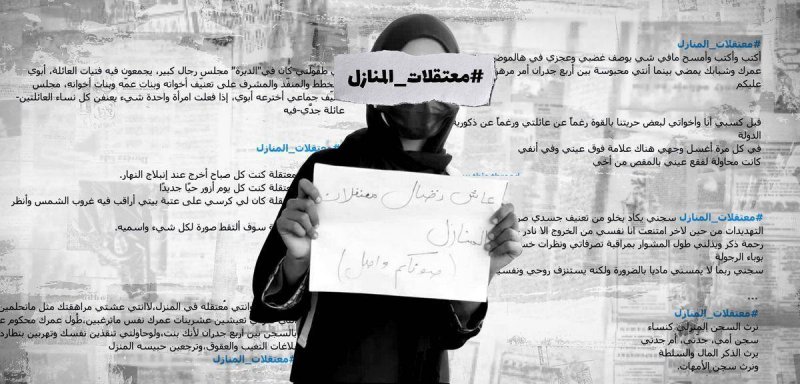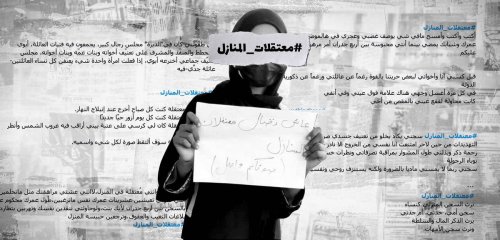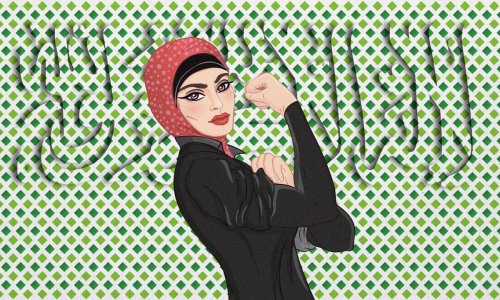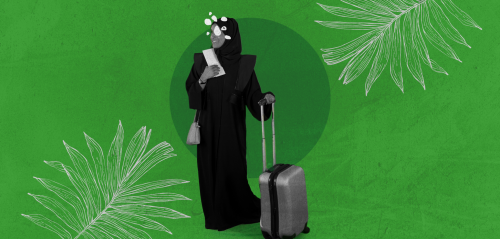“My prison is almost devoid of outright physical abuse despite the occasional threats. My imprisonment may not necessarily touch me physically, but it drains my soul and psyche. My imprisonment kills my passions and aspirations. It chokes off my wishes, desires, talents, ambitions, and even my character. It rendered me severely depressed and obsessive, as well as afflicted me with thousands of psychological ailments.”
This is just one of hundreds of testimonies posted via the hashtag "#HomeDetainees" that was launched by Saudi feminist activists on Twitter, to demand the abolition of the male guardianship system and grant women their right to movement, independence and decision-making. Conjointly, the hashtag was used by many women to share their experiences of patriarchal oppression so that any woman or girl who feels "trapped in her home" should draw strength from the campaign's experiences.
Saudi women have a long history of struggle against the unjust male guardianship system, a structure that essentially grants guardians (a woman's father, brother, husband, etc.) the right to decide women’s fate in terms of education, employment, and health care.
Documenting their bitter experiences of struggle, resistance and violence within the home, Saudi women activists use the hashtag #HomeDetainees in order to completely abolish male guardianship and grant women their freedoms
With the rise of Crown Prince Mohammed bin Salman to power and the implementation of numerous "social reforms" that have given women greater freedom, Human Rights Watch and Saudi rights groups insist that women’s freedom remains inadequate, and that a woman cannot be independent without her parents and relatives "tracking her down and threatening her with placement in notorious care and hospitality homes".
Through the hashtag "#HomeDetainees", Wedyan wrote in a tweet: "I am still detained, and this detention has no fixed duration. My whole life might be spent in vain, wasting away between these walls. Neither the government intends to drop the guardianship system and its malicious reports, nor does my family intend to stop."
She added: "I don't have a single word of consolation and I don't know how we will survive. I am imprisoned and I know that despite our different prisons and borders, the fear is one, the injustice is the same, and the feeling of helplessness and anger is the same."
One user spoke of how “women are closely monitored in homes, with them not having the privacy of closing the door of the room with a key at times and without any chance to go out and explore and live the life they want. What is the point of life if I do not have the chance to go out and try something new?”
Twitter user Ann disclosed what her father subjects the women of the family to: "My father enacted organized and collective violence in our extended family, taking advantage of his position as a cleric and military man who uses his military expertise to abuse the women of the family. Any woman who is discovered to wear heels or a shoulder abaya is brought to the council, and the rest of the women are subjected to the abuse along with her."
Another described life as a woman in Saudi Arabia as akin to being "assaulted with all forms of violence on the psychological, physical, and material level. We spend all our lives inside these prisons where the freedom of women is violated in every sense.”
Women are prisoners in their own homes, a place that is both a "woman's grave and a man's paradise.. I know women whose homes are more terrifying to them than actual prisons and strangers”
One likened the feeling of home detention to being an “immobile piece of furniture in a living room” inside a "family prison,” while another bitterly stated: "I write, and write, and erase. Nothing can describe my anger and helplessness in this matter. You’re seeing your age and youth pass by while you’re trapped between four walls. It's exhausting and tiring. Damn you all."
A young woman chose to tell her sister's story: "My father forged my older sister's signature in her marriage contract, hit her in the face, broke her jaw, and then falsified the medical report."
A "political" struggle, not a family affair
A few tweeters insisted on stressing that women's freedom in Saudi society is not a family affair, as some claim in defense of the state, but rather a political affair. Therefore, the state, even before the family, stands against women's attempts to regain their freedom and their stolen rights.
“My imprisonment may not necessarily touch me physically, but it drains my soul and psyche. It kills my passions, aspirations, wishes, talents, and ambitions, and has rendered me severely depressed and afflicted with mental ailments” #HomeDetainees
"Under the label of preventing women from mixing with men, my family kept me for 24 years in a household prison," one testimony said. “They are now trying to push me into government prison, and hand me over to other men. Your freedom is a political matter, and if you take away part of it yourself, you will be confronted by the state before your father," she said, adding: "The state is within the grasp of the abusers."
Another commented: "A man leaves the house to wherever he wants without any conditions and complications. Unlike a woman who must fulfill complex criteria that drain her before the law because she is a woman. Women are still not free. They are imprisoned at home, even if they live in an independent household, since independent women are still under the watchful eyes of men in the street, the owner of the house, and the government."
Several women considered themselves to be pulled into the struggle for their freedom and that they had no choice in the matter, “While men can choose their struggle, women do not choose their homes or families, they don't own their decisions. They are brought into the struggle even if they don't want to. I know women whose homes were more terrifying to them than actual prisons and strangers.”
“I will not stop tweeting this hashtag, even if I finally smell the air of freedom, because what I‘m living is psychologically exhausting, I will never stop, because I know many other girls who are living the same suffering.”
If I wasn't detained!
The campaign managed to reach beyond Saudi Arabia's borders, as Arab women throughout the region reacted to the hashtag and recounted their experiences with “house detention”, pointing out that it is not limited to the kingdom. One said: “I am a Kuwaiti woman. Despite the distances and differences in gender and race, we share the same pain and suffering and the same prisons set by the patriarchal terrorist regime.”
The female tweeters responded to those who refused to see homes as prisons for women. One of them recounted how her home detention radically changed her, as it "destroyed my ability to communicate with humans and made me absent from the world, making me look as if I was ninety years old. I don't know what a normal woman my age knows, and my jailers don't think it's time for me to live a 'normal' life.”
One young woman wrote: "If I hadn't been detained, I would go out every morning at daybreak. If I hadn't been detained, I would visit a new neighborhood every day. If I hadn't been detained, I would have a chair on my doorstep watching the sunset and looking at passers-by. If I hadn't been detained, I would have taken a picture of everything."
Other tweeters used the campaign to imagine what their lives would be like if they were not under house detention, with one stating, "If I wasn’t detained, I would go out every morning when the day dawned. If I wasn’t detained, I would visit a new neighborhood every day. If I wasn’t detained, I would have a chair on my doorstep, watching the sunset and looking at those who pass by. If I wasn't detained, I'd take a picture of everything.”
“I don't know how we will survive. I am imprisoned and I know that despite our different prisons and borders, the fear is one, the injustice is the same, and the feeling of helplessness and anger is the same” How long will women stay #HomeDetainees?
One user asserted that: “I will not stop tweeting this hashtag, even if I smell the air of freedom, because what I am living is psychologically exhausting, and I will never stop, because I know many other girls who are living the same suffering.”
The Towards Feminist Consciousness and Awareness account, which is concerned with women's rights and issues and is followed by about 30,000 people on Twitter, considered the hashtag a "feminist documentation of domestic violence and experiences of conflict, resistance and violence inside the home". It added that it is also "a feminist means of archiving through which female comrades in Saudi Arabia reveal the various ways of feminist resistance and the effects of violence and violations imposed by the patriarchal authority inside homes."
Raseef22 is a not for profit entity. Our focus is on quality journalism. Every contribution to the NasRaseef membership goes directly towards journalism production. We stand independent, not accepting corporate sponsorships, sponsored content or political funding.
Support our mission to keep Raseef22 available to all readers by clicking here!
Interested in writing with us? Check our pitch process here!







